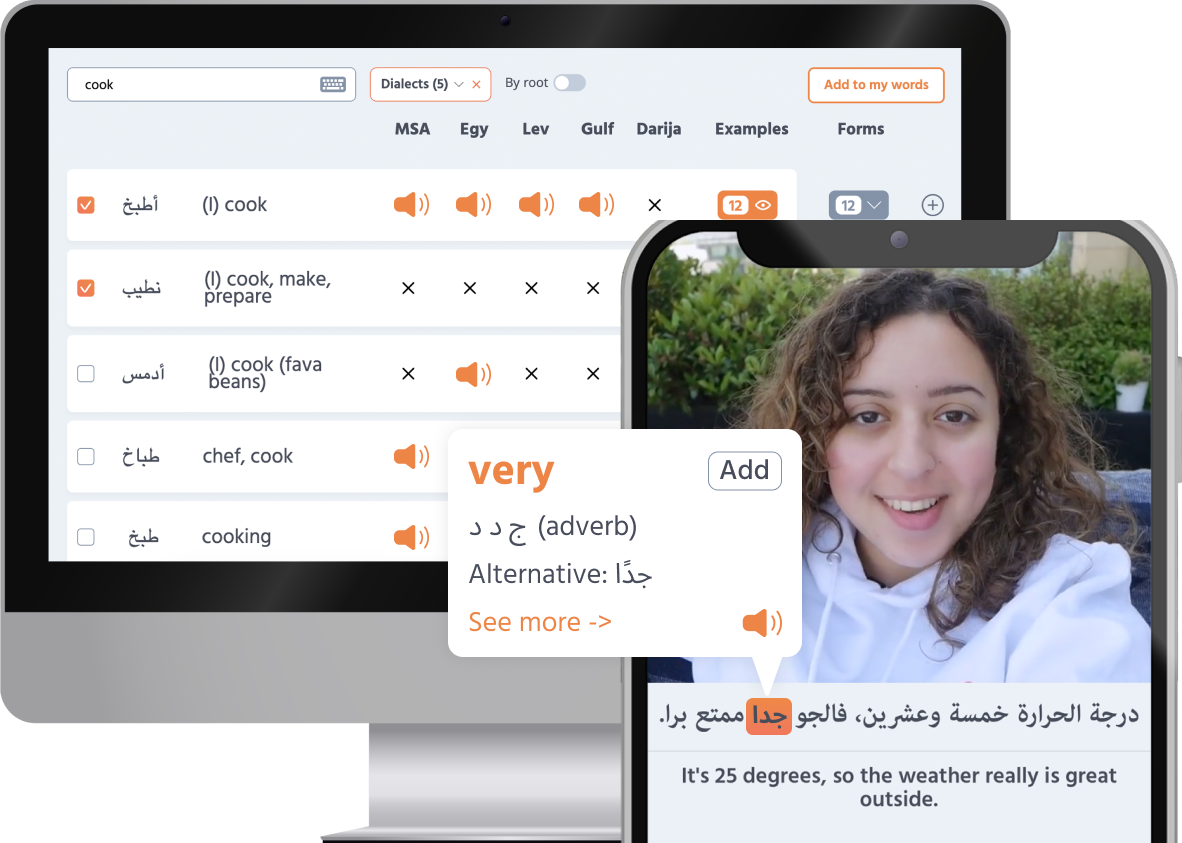If you’re learning Arabic, حبيبي
“habibi” is a word you’ll encounter a lot in spoken Arabic . It’s like the Swiss Army knife of Arabic words—versatile, surprising, and capable of fitting into any conversation. But don’t be fooled; it’s not always lovey-dovey! ⚠️
Lovey-dovey habibi Typically, حبيبي
means “my love.” It’s derived after all from حب
“love”, and حبيب
literally means “beloved” or “a person one loves”. When addressing a female, the term is usually حبيبتي
.
A girl expresses her love for her boyfriend in the Syrian dialect , as featured on Playaling .
Get free Arabic videos with interactive captions for your level
Get free videos
Habibi is an all-purpose term of endearment. It can be used romantically by females to address their husband or boyfriend, or non-romantically to their fathers, brothers, sons, uncles, nephews, others’ children, and so on. Females should use it with caution with non-relative males, otherwise, it might be misinterpreted as a come on.
Males use it frequently to address male relatives, friends, and even strangers, when it’s akin to a British taxi driver saying, “Where are we heading, luv?” Of course, he doesn’t really love you, habibi! But take care not to use it too casually; it’s inappropriate to call your boss, doctor, or an elderly person “habibi”.
Examples
Addressing your husband or boyfriend:
حَبيبي مِستَنِّياك بِالليلْ مَتِتْأَخَّرْش
in Egyptian (Babe, I’m waiting for you; don’t be late.)
A Syrian girl addresses her boyfriend as “habibi.” Addressing your son:
حَبِيبي قُلتِلَك أَلْف مَرَّة مَفِيشْ بِلايستيشَنْ قَبْل ما تخَلَّصْ مُذاكْرِتَكْ
in Egyptian (Honey, I told you a thousand times: no video games before doing your homework).
A Jordanian father encourages his son to eat his food with يا حبيبي.Addressing your father:
حَبِيْبِي بَابَا اشتقتلك
in Levantine (Daddy dear, I missed you!)
Addressing your friend:
حَبِيبي وِيْنَكْ، نَاطْرِيْنَكْ عَالشَدّة
in Levantine (Hey man, where are you? We’re waiting for you to play cards.)
Syrian friends address each other with “habibi.”Nice habibi Habibi gets used to express gratitude, brush off thanks, or even to wrap up conversations with a friendly touch, with subtle changes in tone, depending on context. Some examples:
In Egyptian:
جِبْتِلَكْ التيشِرْت اللي كُنْت عَايزُه
حَبيبي
مَعلِش يَسْطا تَعَّبْناك مَعَانا
(Sorry bro for the inconvenience.)حَبيبي
(It’s okay / No problem)
إشْطا أَشوفَك بُكرا
(Alright, see you tomorrow.)حَبيبي
(See you!)
In Levantine:
يِسْلَمُو
(Thanks!)حَبيبي
(Don’t mention it / You’re welcome)
تْشَرَّفْنا والله
(It’s been a pleasure /Nice to meet you!)حَبيبي
حِلوِينْ تِيَابِكْ
حَبِيبِي
(Thank you!)
Surprised or angry habibi Use habibi to express surprise or anger at what someone says:
In the Syrian show Bab al-Hara, a man expresses indignant surprise over the division of house ownership among himself and his three wives. Stranger habibi Or, use it to address people you don’t know:
A Jordanian calls a waiter حبيبي . Aggressive habibi 😈 Sometimes “habibi” strays from far from affection and into sarcasm, especially in heated conversations.
انتَ فاكِر نَفسَكْ مين يا حَبيبي؟
in Egyptian (Who the heck do you think you are?)
مَا تْوَاخْذِنِي حَبِيْبْيْ ع َط ِيْت َكْ أَكْبَرْ مِنْ حَجْم َكْ
in Levantine (Forgive me, darling. I thought more highly of you than you deserved.)
Using حبيبي sarcastically or to mean the opposite:
Sometimes, “habibi” is used sarcastically or to mean the opposite of its literal meaning, adding a layer of irony or mockery. You can add يا
before both حبيب
and حبيبي
in conversation for emphasis.
A Syrian taxi driver gets mad at his passengers for not paying the fare. Melodic habibi
In Arab love songs, male singers commonly address their lovers as “habibi” rather than “habibti.” This doesn’t mean they’re gay! The reason for using the masculine form is unclear, but several theories suggest why:
Poetic tradition : Classical Arabic poetry used the masculine form for rhyme and meter, influencing modern songs to maintain a lyrical flow.Linguistic simplicity : The masculine form simplifies language, avoiding gender agreement complexities.General grammar rules : In Arabic, the masculine form is used for general instructions and mixed-gender groups.Modesty and female honor : In conservative cultures, the masculine form helps maintains modesty and avoids direct expressions of romantic love in public, especially between unmarried lovers.
A romantic song in Egyptian dialect by the Lebanese singer Ramy Ayyash . Oh, and by the way… If learning Arabic at your own pace, with fun, real-world videos sounds like your style, then Playaling could be exactly what you’re looking for!
With Playaling, you’ll dive into any major Arabic dialect or MSA. Our diverse range of videos has it all—from everyday conversations and cultural moments to music videos, TV and movie clips, influencer content, news broadcasts, and inspiring talks.
Our interactive captions let you tap any word for instant translations, context, and audio. So, real Arabic content becomes accessible with just a click. Miss something? No problem—rewind and listen as often as you need, or hover over subtitles for quick definitions.
Spot a word you want to learn? Save it to your personalized word set, or dive into curated sets for focused practice and easy review.
Interactive exercises let you dive in and practice what you’ve learned.
Need to look something up? The Audio Dictionary has you covered with clear human pronunciations and real world examples.
It’s a learning experience that keeps you engaged, bringing authentic, real-world Arabic closer to you every step of the way.
Give it a try!









